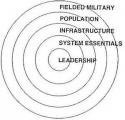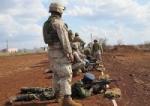Our vision is to develop men and women in our armed services with this exceptional character:
* We need the future members of the military class to be thinkers. This is the only alternative, not only so that they will have the necessary criteria for making good operational decisions, but also so that they can deal with a strategic scenario that is characterized by a growing uncertainty.
* We also want officers and soldiers to share a solid military ethic as the only response for guaranteeing legitimacy in the context of the dramatic dilemmas inherent to war.
* We require Colombian officers to behave as doubly excellent citizens who are capable of setting an example for their countrymen while being aware of their duty to their service.
* Moreover, we expect armed service officers to develop an informed vision of the world and discernment to be able to assume the role of defense intellectuals capable of understanding society’s security needs beyond the current conjuncture.
* We demand that armed forces members be imbued with the character of leaders who can conduct the institution in battle, and also lead it and make it grow in times of peace.
* As is natural, the officer corps must incarnate military ethics such as discipline, determination, and the values that make them the nation’s greatest resource at the times of greatest difficulty.















 I must say I'm not as pessimistic as Max but he said that Dave Spencer (at CHDS) is pessimistic too. That said, I would go on and use the old 1950s-60s slogan of Peru's CAEM, No hay defensa sin desarrollo (there is no defense w/o development). The critical development IMO is a real civil service in all areas. For example, although the MOD is a civilian, his position in the chain of command is shaky at best and the position is totally political. Well, you say, ours is too. Yes, but, look at the politicals, especially our USDP, Michelle Flournoy a total defense professional and one in the shadow Democratic Administration for the duration of the G W Bush years. There is nothing like this in Colombia. My old colleague from CHDS, Andres Suarez, attached himself to the Deputy MOD; when that gentleman moved on to the intel service he took Andres with him. Nor are there professional civilian bureaucrats in the MOD or other ministries who continue beyond a single Presidency. Thus there is no institutional civil service in Colombia or most of Latin America. There are exceptions like Chile and Argentina or the Brazilian foreign service (and some others) but mostly they aren't. Another area of major weakness is in the realm of legislative staff. they really don't exist either. (As a FAO you will be beleaguered by CODELS consisting solely of Staff but remember as you are griping that thos staffers [kids barely out of diapers] are the ones who provide the Congressmen and senators the info they need.) Anyway, good, professional legislative staff is essential to intelligent institutionalization and development.
I must say I'm not as pessimistic as Max but he said that Dave Spencer (at CHDS) is pessimistic too. That said, I would go on and use the old 1950s-60s slogan of Peru's CAEM, No hay defensa sin desarrollo (there is no defense w/o development). The critical development IMO is a real civil service in all areas. For example, although the MOD is a civilian, his position in the chain of command is shaky at best and the position is totally political. Well, you say, ours is too. Yes, but, look at the politicals, especially our USDP, Michelle Flournoy a total defense professional and one in the shadow Democratic Administration for the duration of the G W Bush years. There is nothing like this in Colombia. My old colleague from CHDS, Andres Suarez, attached himself to the Deputy MOD; when that gentleman moved on to the intel service he took Andres with him. Nor are there professional civilian bureaucrats in the MOD or other ministries who continue beyond a single Presidency. Thus there is no institutional civil service in Colombia or most of Latin America. There are exceptions like Chile and Argentina or the Brazilian foreign service (and some others) but mostly they aren't. Another area of major weakness is in the realm of legislative staff. they really don't exist either. (As a FAO you will be beleaguered by CODELS consisting solely of Staff but remember as you are griping that thos staffers [kids barely out of diapers] are the ones who provide the Congressmen and senators the info they need.) Anyway, good, professional legislative staff is essential to intelligent institutionalization and development.

Bookmarks